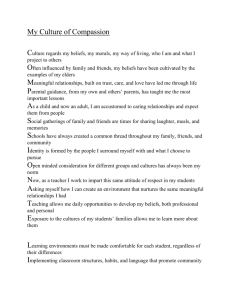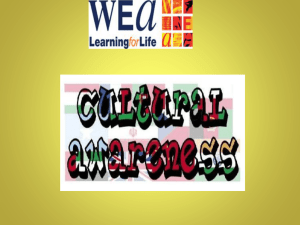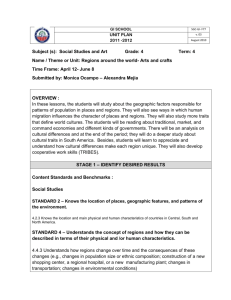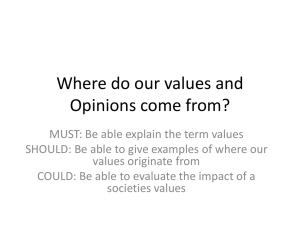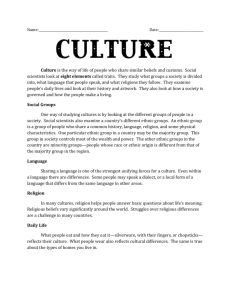CULTURAL LITERACY
advertisement
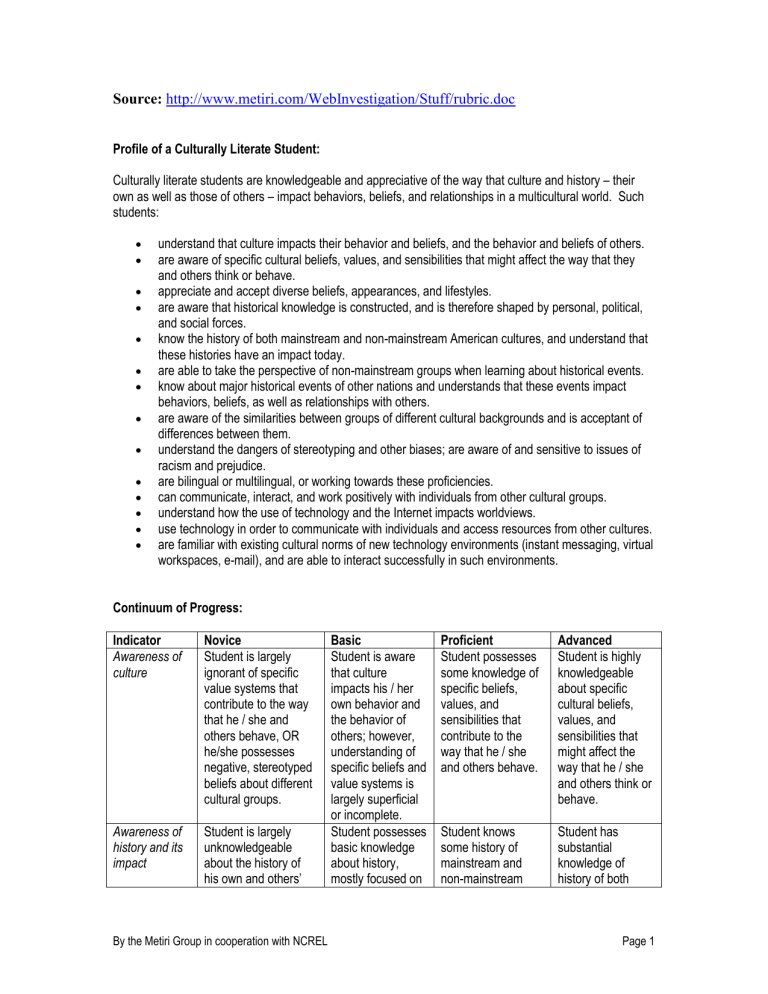
Source: http://www.metiri.com/WebInvestigation/Stuff/rubric.doc Profile of a Culturally Literate Student: Culturally literate students are knowledgeable and appreciative of the way that culture and history – their own as well as those of others – impact behaviors, beliefs, and relationships in a multicultural world. Such students: understand that culture impacts their behavior and beliefs, and the behavior and beliefs of others. are aware of specific cultural beliefs, values, and sensibilities that might affect the way that they and others think or behave. appreciate and accept diverse beliefs, appearances, and lifestyles. are aware that historical knowledge is constructed, and is therefore shaped by personal, political, and social forces. know the history of both mainstream and non-mainstream American cultures, and understand that these histories have an impact today. are able to take the perspective of non-mainstream groups when learning about historical events. know about major historical events of other nations and understands that these events impact behaviors, beliefs, as well as relationships with others. are aware of the similarities between groups of different cultural backgrounds and is acceptant of differences between them. understand the dangers of stereotyping and other biases; are aware of and sensitive to issues of racism and prejudice. are bilingual or multilingual, or working towards these proficiencies. can communicate, interact, and work positively with individuals from other cultural groups. understand how the use of technology and the Internet impacts worldviews. use technology in order to communicate with individuals and access resources from other cultures. are familiar with existing cultural norms of new technology environments (instant messaging, virtual workspaces, e-mail), and are able to interact successfully in such environments. Continuum of Progress: Indicator Awareness of culture Novice Student is largely ignorant of specific value systems that contribute to the way that he / she and others behave, OR he/she possesses negative, stereotyped beliefs about different cultural groups. Awareness of history and its impact Student is largely unknowledgeable about the history of his own and others’ By the Metiri Group in cooperation with NCREL Basic Student is aware that culture impacts his / her own behavior and the behavior of others; however, understanding of specific beliefs and value systems is largely superficial or incomplete. Student possesses basic knowledge about history, mostly focused on Proficient Student possesses some knowledge of specific beliefs, values, and sensibilities that contribute to the way that he / she and others behave. Advanced Student is highly knowledgeable about specific cultural beliefs, values, and sensibilities that might affect the way that he / she and others think or behave. Student knows some history of mainstream and non-mainstream Student has substantial knowledge of history of both Page 1 cultures, and he/she shows no interest in learning more. Perspective taking - history Student does not realize that knowledge of history is socially and politically constructed; when learning about history, does not independently assume the perspective of nonmainstream groups. Stereotyping and bias Student does not understand that stereotyping and other biases are not acceptable, and tends to engage in these behaviors. Student internalizes implicit, biased messages about other cultural groups (e.g., in media). Tolerance Student fails to recognize similarities between his/her own culture and other cultures; he/she judges differences in behavior or lifestyle negatively, and does not associate with individuals from different cultural groups. By the Metiri Group in cooperation with NCREL mainstream American cultures. He / she is largely unaware of how history has shaped relationships among diverse groups. American cultures, and of other nations; he / she understands that these histories impact relationships today, but this understanding is unsophisticated. mainstream and non-mainstream American cultures, and the history of other nations. He / she has a sophisticated understanding of how these histories have impacted relationships among groups. Student requires Student realizes that Student realizes substantial history is socially that history is assistance to constructed. With socially and recognize that minimal guidance, politically knowledge of he / she is able to constructed, and history is socially take the perspective has sufficient constructed, and to of non-mainstream knowledge to assume the groups when spontaneously perspective of non- learning about take the mainstream historical events. perspective of nongroups when mainstream groups learning history. when learning history. At a general level, Student Student student understands the understands the understands that dangers of dangers of stereotyping and stereotyping and stereotyping and other biases are other biases; he/she other biases, is not acceptable; is aware of and sensitive to issues however, he/she is sensitive to issues of racism and not sensitive to the of racism and prejudice, and impact of prejudice prejudice, and highly cognizant of or to biased sometimes biased messages messages about recognizes biased about other cultural other cultural messages about groups (e.g., within groups (e.g., in other cultural groups media). media). (e.g., in media). With a few With guidance, Student exceptions, student is cognizant understands that student fails to of similarities individuals from recognize between his/her diverse cultures similarities own culture and share some between his/her other cultures. fundamental own culture and He/she appreciates beliefs; he/she other cultures. and accepts appreciates and Although not individuals with accepts diversity, negative about diverse beliefs, and seeks differences in appearances, and opportunities to behavior or lifestyles. learn about and Page 2 lifestyle, student only occasionally associates with individuals from different cultures. Student is willing to learn another language, but does not appreciate the value of this skill. Although student makes a genuine attempt to learn a new language, these efforts are motivated by course requirements. interact with different cultures. Language proficiency Student is not interested in learning other languages. Efforts made towards these skills are superficial and motivated almost entirely by course requirements. Interactions with individuals from different cultures Student communicates, interacts, or works poorly with individuals from other cultural groups. Under supervision, student can generally communicate, interact, and work positively with individuals from other cultural groups. Student usually communicates, interacts, and works positively with individuals from other cultural groups. Use of resources from different cultures Student avoids using technology to gain access to individuals or resources from other cultures. Student sometimes uses technology to gain access to individuals or resources from other cultures; these efforts are sometimes selfinitiated and intrinsically motivated. Awareness of the way that technology influences worldviews Student does not understand that technology impacts his/her own and others’ worldviews. With substantial guidance, student is willing to use technology to gain access to individuals or resources from other cultures; however, these efforts are generally motivated by course requirements. Student understands that technology allows access to other cultures, but does not understand the By the Metiri Group in cooperation with NCREL Student understands the value of being multilingual, is at or working towards this proficiency, and is intrinsically motivated to acquire new languages. Student has some understanding of the way technology impacts his/her own and others’ worldviews. Student understands the value of being multilingual, is at or working towards this proficiency, and is intrinsically motivated to learn not only a new language, but also about the culture from which the language is derived. Student almost always communicates, interacts, and works positively with individuals from other cultural groups; he/she seeks opportunities to learn from diverse perspectives. Student regularly uses technology to gain access to individuals or resources from other cultures; these efforts are generally motivated by interest and exceed course requirements. Student has an insightful understanding of the way technology impacts his/her own and others’ Page 3 impact of this access on worldviews or societies. Culture of technological environments Student has no knowledge about the culture of technological environments (e.g., online chats, instant messaging, MOOs, MUDs), and, does not participate in these forums. Student has some basic knowledge about the culture of technological environments (e.g., online chats, instant messaging, MOOs, MUDs), and participates minimally in these forums. Student is reasonably fluent in the culture of technological environments (e.g., online chats, instant messaging, MOOs, MUDs), and can participate frequently in these forums. worldviews (e.g., by allowing individuals to access pop culture, news, ideas, from other societies). Student has substantial and sophisticated knowledge about the culture of technological environments (e.g., online chats, instant messaging, MOOs, MUDs), and can participate fully in these forums. References and Links: Arvizu, S. and Saravia-Shore, M. (1990). Cross-Cultural Literacy, An Anthropological Approach to Dealing with Diversity. Education and Urban Society, 22(4), pgs. 364-376. Banks, J. A., Cookson, P., Gay, G, Hawley, W., Irvine, J. J., Nieto, S., Schofield, J. W., and Stephan, W. G. (2001). Diversity within Unity. Essential Principles for Teaching and Learning in a Multicultural Society [Online]. Available: http://depts.washington.edu/coe/news/DiversityUnity.pdf Beaupre, B. (2000). Blending Cultural, Academic, and Technological Communication: Literacy for the New Millennium. ED 441234 [Online]. Available: http://ed.gov.databases/ERIC_Digests/ed441234.html Brandt, Ron (1994). On Educating for Diversity: A Conversation with James A. Banks. Educational Leadership, 51(8), pgs. 28-31 Burnette, J (1999). Critical Behaviors and Strategies for Teaching Culturally Diverse Students. ED 435147 [Online]. Available: http://ed.gov.databases/ERIC_Digests/ed435147.html Anicich, M. and Kirk, R. (1999). Cultural Awareness Education in Early Childhood Education. ED 433928 [Online]. Available: http://ed.gov.databases/ERIC_Digests/ed433928.html Gay, Geneva (1994). A Synthesis of Scholarship in Multicultural Education. Urban Education Monograph Series. NCREL. [Online]. Available: www.ncrel.org/sdrs/areas/issues/educatrs/leadrshp/le0gay.htm Gura, Mark (1994). The Human Mosaic Project. Educational Leadership, 51(8), pgs. 40-1 Hirsch, E. D. (1987). Cultural Literacy: What Every American Needs to Know. Boston: Houghton Miffin Janzen, Rod (1994). Melting Pot or Mosaic. Educational Leadership, 51(8), pgs. 9-11 By the Metiri Group in cooperation with NCREL Page 4 Ladson-Billings, Gloria (1994). What We Can Learn From Multicultural Education Research. Educational Leadership, 51(8), pgs. 22-26 Parkinson, W. and Saunders, S. (1999). Cultural Literacy and Languages: Enabling Students to Learn to Live Together. ED 449058 Petropoulou, Z. (1992). Cross-Cultural Awareness in Teaching Business French Courses in an Academic Environment: Problems and Difficulties. ED357599 Stigler, J. W., Gallimore, R., Hiebert, J. (2000). Using video surveys to compare classrooms and teaching across cultures: Examples and lessons from the TIMSS Video Studies. Educational Psychologist, 35(2), 87-100. Taylor, P. (1999). Cultural Literacy: Are Practically Average Knowledge Levels Enough. ED 448148 [Online]. Available: http://ed.gov.databases/ERIC_Digests/ed448148.html Wass Van Ausdall, Barbara (1994). Books Offer Entry into Understanding Cultures. Educational Leadership, 51(8), pgs. 32-5 By the Metiri Group in cooperation with NCREL Page 5 GLOBAL AWARENESS Definition: Global awareness is the recognition and understanding of interrelationships among international organizations, nation states, public and private economic entities, socio-cultural groups, and individuals across the globe. Quote: “… the world's corporate and political leadership is undertaking a restructuring of global politics and economics that may prove as historically significant as any event since the Industrial Revolution. This restructuring is happening at tremendous speed...” -International Forum on Globalization (http://www.ifg.org/) Accessed 11-27-01 [Image] Importance in the Digital Age: According to Thomas Friedman, author of the Lexus and the Olive Tree, globalization has replaced the Cold War in defining international relationships. Access to telecommunications and technology has caused shifts in power from nation states to multinational corporations, public and private economic entities, socio-cultural groups, and even individuals. Today, international commerce accounts for nearly a quarter of the American economy. A third of recent U.S. economic growth and a quarter of new job creation are due to exports. The world marketplace is even more important to particular sectors of the economy. One out of every two acres of wheat grown by American farmers is exported. More than two-fifths of the production of the domestic computer industry – including computer systems, hardware, and peripherals – is exported, and nearly three-fifths of the computer equipment Americans rely on is imported (Citizen’s Guide to U.S. Foreign Policy, 2000, pgs. 716). But as U.N. Secretary-General, Kofi Annan, reminds us: “Unless the basic principles of equity and liberty are defended in the political arena and advanced as critical conditions for economic growth,” the rewards reaped from a global economy will be limited (speech at Harvard University, September 17th, 1998). Indeed, informed citizens worldwide are beginning to articulate wider principles, policies, and politics of “global By the Metiri Group in cooperation with NCREL Page 6 awareness.” Central to these efforts is the belief that trade, investment, and technology are not ends in themselves; they are tools for promoting the ideals of equality, democracy, good jobs, a clean environment, and healthy communities. The fair treatment of workers, the possible depletion of environmental resources, higher international health and safety standards, consumer protections, and issues of overpopulation, illiteracy, poverty, racism, hunger, aging, justice, immigration transcend national boundaries; they have become a growing part of our 21st century consciousness. Multinational flows of ideas, information, capital, labor, and even identity are concerns of the present that are not likely to diminish in an increasingly interconnected global future. Communications technology, of course, is a tremendously important component of global awareness; the use of such technologies invariably informs our response to issues of globalization. According to John Naisbitt, “With the activities of the world being replayed for us in our living rooms each night, none of us can feign ignorance about affronts to society’s ethical standards. We have all become our brother’s keepers – at least in this sense. Communications technology has empowered individuals and communities through instant access to information of all kinds. With that access comes responsibility. Are we up to the task?” (Global Paradox, 1994, p.193). Profile of a Globally Aware Student: Globally aware students consider themselves global citizens. As such they use digital-age technologies to learn, think, participate in, and communicate about global issues. Globally aware students: are aware of how technology links nations and individuals, as well as how it enables the global economy. understand the interconnectedness of the global economy. are aware of how the global economy impacts political decision-making – including the formal and informal pacts nations enter into. are aware of the social, environmental, and micro-economic impacts of global decisions made by both national and international (e.g. the U.N., the I.M.F.) organizations. understand how cultural differences (e.g. beliefs, traditions, religions) impact personal and national participation at the global level. understand the impact of ideology and culture on national decisions about access to and use of technology. participate in the global society through interactions with persons in another country or culture. Continuum of Progress: By the Metiri Group in cooperation with NCREL Page 7 Indicator Novice Basic Proficient Advanced Awareness of technology’s impact on interconnections between nations/ individuals, global economy Student is unaware of the role that technology plays in enabling a global economy. He/she knows at a very superficial level that technology links individuals from different nations. Student is aware that technology plays an important role in linking nations/individuals and in enabling the global economy. However, this knowledge is general, limited (e.g., student may define technology too narrowly), or includes significant misconceptions. Student has some understanding of the ways in which technology has been an essential part of the global economy. He/she understands some of the effects technology has had in linking nations /individuals and enabling exchange of goods, services, and information. Student understands beyond gradelevel expectations -how technology links nations/individuals , how it enables the global economy, and how it changes the nature of the resources (e.g. information vs. goods) that can be traded. Understanding of the interconnectedness of the global economy Student does not understand that economies of nations impact one another. Student is aware that national economies impact one another, but this knowledge is general and sparse. Student is aware that economic conditions of one nation can impact those of other nations, but he/she is not aware of political/social/ environmental issues raised by economic interdependence. Student understands – beyond gradelevel expectations – how economies impact each other; he/she can think critically about political/ social/ environmental issues raised by economic interdependence. Understanding of the impact of global economy on political decision-making Student is unaware of the impact of economic considerations on political decisionmaking. He/she may be largely unaware of political events and international economic conditions. Student is generally aware that political decisions are shaped by economic considerations; however, he/she has little knowledge of specific considerations and national/ international policies. Student is aware of some of the economic considerations that drive political decisions. However, this knowledge is somewhat limited or tends to cast issues in black and white terms. Student possesses knowledge – beyond grade level expectations – of economic considerations that drive specific national policies and decisions. He/she can critically evaluate the gains and losses that result from these policies. Understanding the impact of decisions made Student has no knowledge of the impacts of Student understands very generally that Student understands how some specific Student has an excellent understanding of By the Metiri Group in cooperation with NCREL Page 8 by national, international organizations on societies, environment, economies decisions made by national/internation al organizations. He/she has little knowledge of these organizations or their functions. national and international organizations impact societal, environmental, and micro-economic conditions, but is unaware of specific policies/decisions that impact his/her world. decisions made by national/internation al organization impact many facets of his/her day-today world; however, knowledge is limited or tends to cast issues in black and white. the way specific decisions made by national/internatio nal organizations impact his/her day-to-day world. He/she is able to evaluate these issues critically and thoroughly. Understanding of the impact of culture on political relationships Student is unaware of the ways in which culture impacts national/personal political decisionmaking. Student understands that culture impacts national/personal political decisionmaking, but his/her view tends to cast these issues in black and white. Knowledge is either sparse or includes significant misconceptions. Student understands some specific ways in which culture impacts national/personal political decisionmaking. Student has an excellent understanding of the ways in which culture impacts decision-making of specific nations/groups. This understanding is fair and takes into account multiple cultural perspectives. Understanding of the impact of ideology, culture on decisions related to technology and access Student is unaware of differences in societies’ access to technology and information; he/she is unaware that political ideologies and culture impact individuals’ access to these resources. Student understands at a general level that nations differ in the degree to which they allow citizens access to technology/ information. However, this knowledge is sparse. Student understands some of the ideological and cultural issues that drive national decisions about access to technology and information. Student has specific and welldeveloped knowledge of ways in which access to technology/inform ation is impacted by culture and political ideology. He/she is able to transfer this knowledge when learning about similar issues with which he/she is unfamiliar. The student has a growing awareness of the global nature of the world. He/she is interested in the study of international policy The student recognizes his/her own role as an individual in a global society. As such he/she - when guided -participates The student is aware of how his/her actions and the actions of his/her country exert influence globally. He/she Participation in the In many cases it global society has not occurred to the student that persons in other nations directly influence his/her life socially, By the Metiri Group in cooperation with NCREL Page 9 politically, and economically. and affairs—but action is limited to learning and reflection. locally through economic, political, or social means (e.g., donations to relief efforts, contributions to international social, health, or environmental concerns). seeks to understand the global impact of personal actions (e.g., consumerism based on company policies, consumption of energy, or recycling), and acts accordingly. References and Links: Anderson, Sarah, John Cavanagh, Thea Lee, and the Institute for Policy Studies. Field Guide to the Global Economy. New York, NY: The New Press, 2000. Annan, Kofi. Speech to Harvard University, September 17, 1998. Castells, Manuel. The Rise of the Network Society. Oxford, U.K.: Blackwell, 1996. Drucker, Peter (2001, November 3). The Next Society. The Economist, Special Supplement, pgs. 3-20 The Economist (2001). Pocket World in Figures, 2001 ed. London, U.K.: Profile Books Foreign Policy Association (2000). Citizen’s Guide to U.S. Foreign Policy: The Critical Issues. NY: Foreign Policy Association Friedman, Thomas L. (1999). The Lexus and the Olive Tree: Understanding Globalization. NY: Farrar, Straus & Giroux Friedman, Thomas L. (2001)Presentation to the Indiana Humanities Council. Naisbitt, John (1994). Global Paradox. New York: Avon Sassen, Saskia (1988). The Mobility of Labor and Capital. Cambridge, U.K.: Cambridge University Press By the Metiri Group in cooperation with NCREL Page 10
